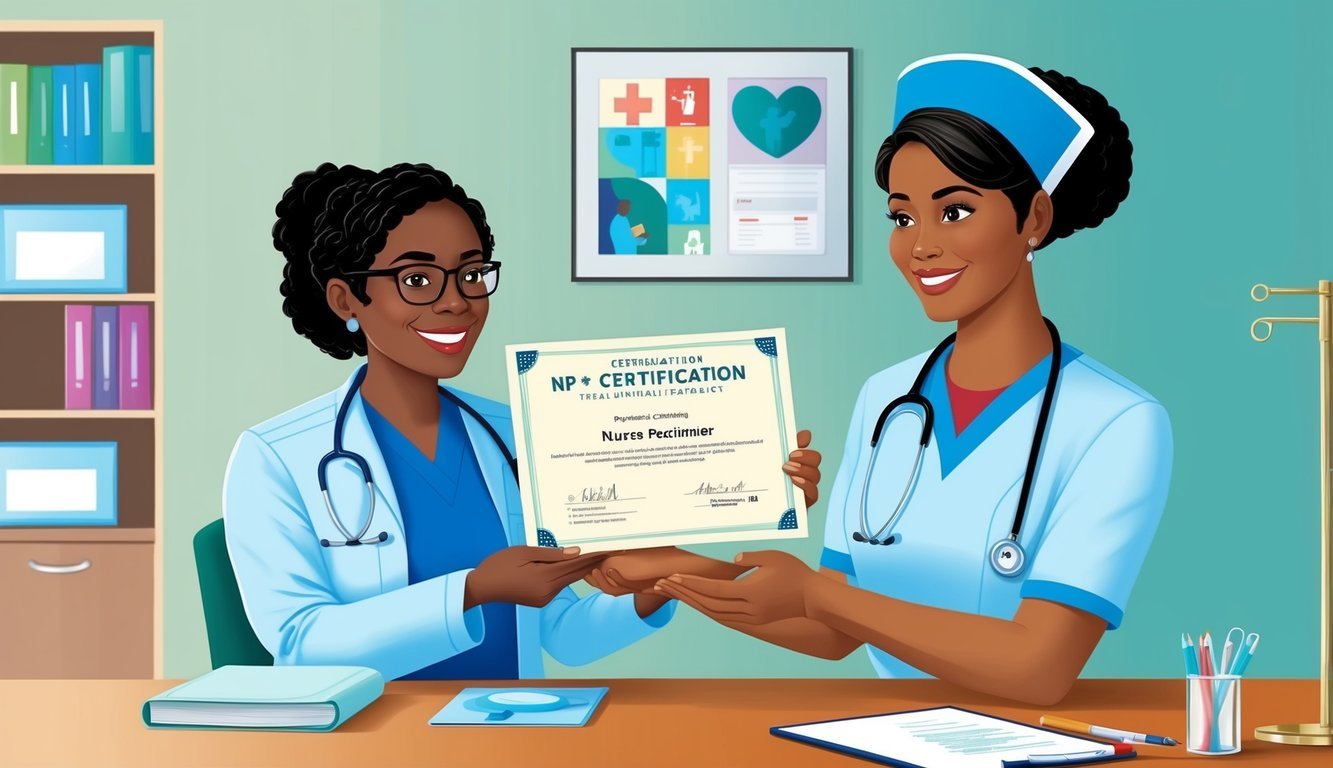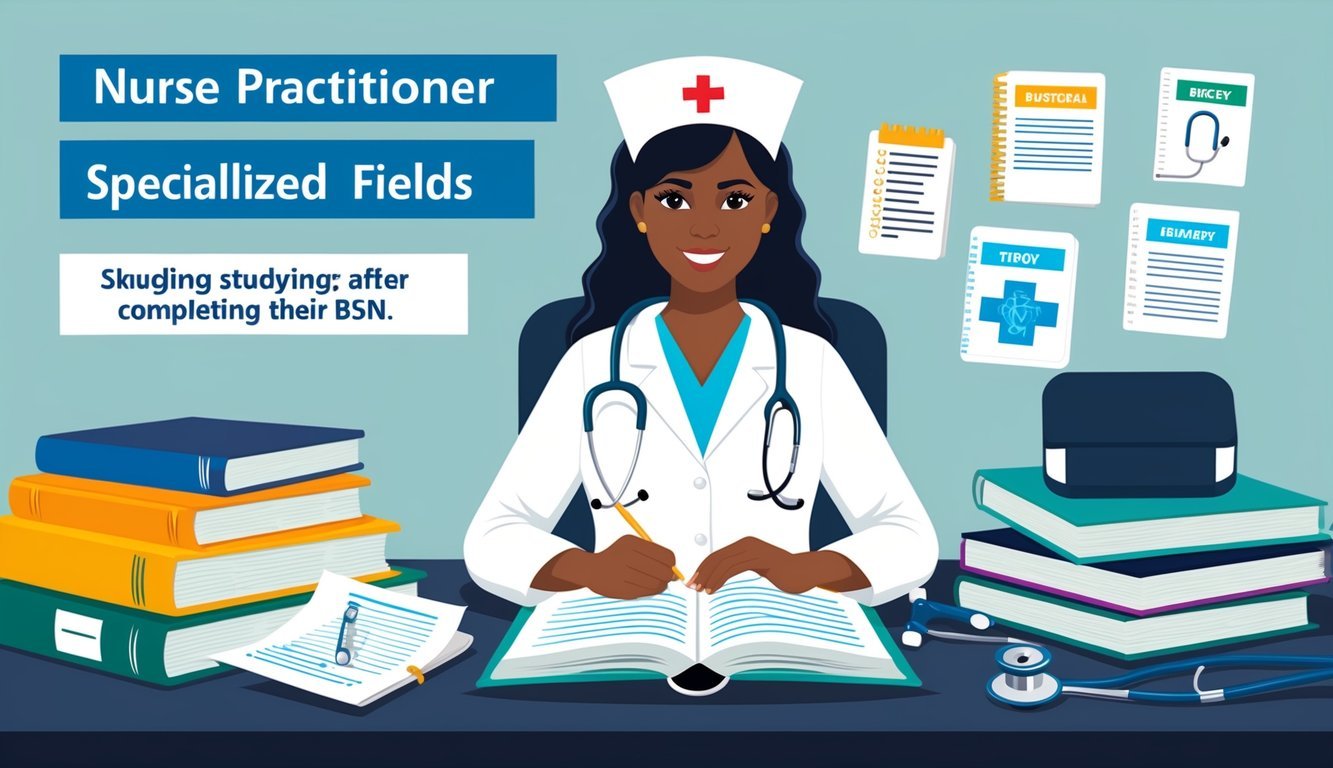Transitioning from a Bachelor of Science in Nursing (BSN) to becoming a nurse practitioner (NP) is an exciting journey that enhances your career opportunities. A Doctor of Nursing Practice (DNP) program typically takes 3 to 4 years to complete after earning your BSN.
This timeframe can vary based on factors such as your school’s curriculum and whether you choose a part-time program, which may extend your studies to 4 to 7 years.
As you consider becoming a nurse practitioner, it’s important to look at the different pathways available.
Many programs allow you to specialize in various fields of healthcare, catering to your interests and career goals.
Additionally, the investment in your education can lead to a significant increase in your earning potential compared to your current RN salary.
If you’re ready to take the next step, exploring program options is crucial.
Many resources are available to help you understand what is required and to support you throughout the process of becoming an NP.
For further insights, check out this guide on how long it takes to become a nurse practitioner.
Pathways to Becoming a Nurse Practitioner
To become a Nurse Practitioner (NP), you need to follow several educational pathways after earning your Bachelor of Science in Nursing (BSN).
Here are some common options:
| Pathway | Description |
|---|---|
| BSN to NP | This direct route involves enrolling in a nurse practitioner program that typically requires a master’s degree in nursing. You can complete these programs in about 2-3 years. |
| RN-to-MSN | If you already hold an Associate Degree in Nursing (ADN), you can pursue an RN-to-MSN program. This pathway allows you to obtain your master’s while transitioning to an NP role. Duration varies by program. |
| DNP Programs | Doctor of Nursing Practice (DNP) programs offer advanced training and focus on clinical practice. These can take an additional 2-4 years after your master’s. |
| Online Nurse Practitioner Programs | Many universities offer online NP programs for flexibility. You can balance work with your studies. Check individual program requirements for specifics. |
As you explore these options, consider your career goals and lifestyle.
Some institutions may have specific prerequisites or additional opportunities for specialization within nurse practitioner programs.
For more details on each pathway, you can visit Nurse.org to find information regarding requirements and program formats.
Educational Requirements
To pursue a Nurse Practitioner (NP) role, you must first meet specific educational requirements that include earning a Bachelor of Science in Nursing (BSN) and selecting an appropriate graduate degree program.
Both the MSN and DNP pathways offer unique training and opportunities for future NPs.
Bachelor of Science in Nursing (BSN)
Before advancing to NP programs, you need to obtain a BSN degree.
This undergraduate program typically takes four years and includes both classroom education and clinical training.
Key subjects covered in BSN programs include:
- Nursing fundamentals
- Anatomy and physiology
- Pharmacology
- Microbiology
Completing a BSN is critical as it prepares you for the foundational knowledge required in advanced practice.
Additionally, a BSN is often a prerequisite for most MSN and DNP programs.
You can find accredited BSN programs through organizations like AACN to ensure quality education.
Graduate Degree Options: MSN and DNP
After obtaining your BSN, you must choose a graduate program.
The two primary options are the Master of Science in Nursing (MSN) and the Doctor of Nursing Practice (DNP).
| Degree Type | Duration | Focus |
|---|---|---|
| MSN | 2-3 years | Advanced nursing practice, clinical skills |
| DNP | 3-4 years | Leadership, policy advocacy, and research |
The MSN program is designed to prepare you for direct NP roles and emphasizes clinical practice.
Conversely, the DNP program focuses on developing leadership skills and applying evidence-based practices.
Both programs necessitate an active, unencumbered RN license and require completion of specific prerequisites.
Explore various MSN programs for your next steps in nursing education.
Clinical Training and Certification

Clinical training and certification are crucial components of your journey to becoming a Nurse Practitioner (NP).
This phase includes obtaining the necessary licenses and certifications, completing clinical hours, and passing certification exams.
Licensure and Certifications
To practice as a Nurse Practitioner, you must first obtain your Registered Nurse (RN) license by passing the NCLEX-RN examination.
Once licensed, you can pursue further certification as an Advanced Practice Registered Nurse (APRN).
This involves completing a graduate program in nursing and meeting specific certification requirements.
The two primary certification bodies are the American Nurses Credentialing Center (ANCC) and the American Association of Nurse Practitioners (AANP).
After completing your training, you will take a national certification exam.
Successfully passing this exam grants you board certification, which is a vital step in your professional practice.
Clinical Experience and Advanced Education
Clinical training typically requires a minimum of 500 clinical hours as part of your graduate program.
These hours are vital for applying theoretical knowledge in real-world settings.
Experience in diverse clinical environments, including hospitals, clinics, and community health agencies, enhances your readiness.
Moreover, advanced education focuses on specialized areas of practice, such as family, pediatrics, or gerontology.
This training prepares you for the clinical challenges you may face.
Completing your clinical rotations under the supervision of experienced practitioners is essential for honing your skills and knowledge, which is vital for your future as an NP.
Specializations in Nurse Practitioner Fields

Nurse practitioners (NPs) have diverse specialization options, allowing you to tailor your career.
Specializations often focus on specific patient populations or types of care.
Understanding these fields can help you choose the right path based on your interests and career goals.
Primary Care and Acute Care Specializations
Primary care nurse practitioners (PCNPs) provide comprehensive care to patients across various ages.
You often address prevention, wellness, and management of chronic diseases.
The family nurse practitioner (FNP) role is particularly prominent in this area, offering services to individuals of all ages.
In contrast, acute care nurse practitioners (ACNPs) focus on patients with serious conditions requiring immediate attention.
The adult-gerontology acute care nurse practitioner (AGACNP) specialization is crucial for managing acute issues in adults.
Roles like pediatric nurse practitioner (PNP) cater to children’s healthcare needs, providing acute and chronic care specific to younger populations.
Population-Focused Specialties
You can also choose from several population-focused specialties in the NP field.
The psychiatric mental health nurse practitioner (PMHNP) focuses on mental health, managing patients with various psychiatric disorders.
This specialization emphasizes therapeutic interventions and medication management.
Women’s health nurse practitioners (WHNPs) provide care specifically for women, including reproductive health services.
Similarly, neonatal nurse practitioners (NNPs) cater to the health of newborns, often in critical care settings.
Gerontology nurse practitioners (GNPs) focus on elderly patients, addressing the complexities of aging, such as chronic disease management.
These specializations enhance the ability of NPs to meet the specific demands of diverse patient groups.
Consider your interests carefully as you determine the best fit for your career in nursing.
Professional Development and Career Opportunities

As a nurse practitioner (NP), you have numerous opportunities for professional development and career advancement.
The role not only enhances your clinical skills but also opens doors for leadership positions within healthcare settings.
Key Career Opportunities:
| Opportunity | Description |
|---|---|
| Leadership Roles | NPs can lead healthcare teams and initiatives, influencing the quality of care. |
| Specialization | You can pursue advanced certifications in areas like pediatrics, geriatrics, or mental health. |
| Clinical Practice | NPs have prescriptive authority, allowing you to prescribe medications and manage patient care effectively. |
The job outlook for NPs is strong.
According to the U.S. Bureau of Labor Statistics, employment for nurse practitioners is projected to grow 45% from 2029 to 2039, significantly faster than the average for other professions.
With an advanced nursing degree, the scope of your practice expands, enabling you to provide a wider range of services.
You may work in various settings, including hospitals, clinics, and private practice.
Your role as a healthcare provider will also allow you to impact patient outcomes directly.
Engaging in continuous education and professional organizations can further enhance your skills and network.
For more information on advancing your career, consider exploring resources from organizations like the American Association of Nurse Practitioners.
The Role of Nurse Practitioners in Healthcare
Nurse practitioners (NPs) play a vital role in modern healthcare, contributing significantly to patient care, health promotion, and the overall efficiency of healthcare systems.
Their advanced training allows them to manage diseases, promote health, and operate with a high degree of autonomy.
Patient Care and Disease Management
As a nurse practitioner, you are integral in providing high-quality patient care.
You perform comprehensive assessments, diagnose illnesses, and create personalized treatment plans.
- NPs often manage chronic conditions such as diabetes, hypertension, and asthma.
- You can prescribe medications, order diagnostic tests, and interpret the results.
This advanced practice nursing role enables you to address complex health needs and improve patient outcomes.
The emphasis on patient-centered care promotes better adherence to treatment plans and fosters a trusting relationship between you and your patients.
Health Promotion and Disease Prevention
Nurse practitioners are key players in health promotion and disease prevention strategies.
You focus on educating patients about lifestyle changes that can avert health issues.
Common activities include:
- Conducting health screenings and immunizations
- Offering counseling on nutrition, exercise, and smoking cessation
By prioritizing preventive measures, you help reduce the incidence of diseases, leading to healthier communities.
Your ability to tailor advice to individual patients means that strategies are often more effective, resulting in improved health literacy and self-management skills.
Autonomy and Expanded Scope of Practice
As an NP, you also have a high level of autonomy within the healthcare system.
In many states, NPs have full practice status, so you can operate independently.
Key aspects of autonomy and expanded practice include:
- You can diagnose and treat health conditions without physician oversight in certain areas.
- You can also engage in specialized practices, such as family care or mental health.
This expanded scope allows you to meet the healthcare needs of diverse populations efficiently.
By leveraging your training, you can improve access to care, particularly in underserved areas.

